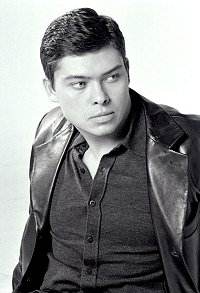S & H Recital Review
Tchaikovsky & Rachmaninov, Daniil Shtoda (tenor), Larissa Gergieva (piano), Wigmore Hall, 19th June 2003 (MB)
Daniil Shtoda has, in some quarters, been acclaimed as the next great Russian tenor (even being compared with Gedda and Wunderlich, two of the greatest lyric tenors of the last century), but it is an opinion this reviewer believes to be both misguided and premature, at least based on this recital. More a ‘tenorino’ than tenor, he has the ability to strike the top notes with razor sharp precision (with one notable exception, as I shall describe later) but the problem is that his ultra-high voice reveals a distinct lack of depth to his interpretations with, for example, the darker broadside of the Rachmaninov songs being conspicuously missing in this recital.And how unfortunate that we only heard him in Russian songs. The over-riding impression of much of this recital was of one that lacked tonal colour, with much of the Tchaikovsky being delivered in the kind of deadpan manner, with a lack of expressivity that did these songs little favour. Romances – such as ‘I’ll tell you nothing’ and ‘Serenade’ – provided little insight into Tchaikovsky’s almost obsessive preoccupation with the unhappiness of love, although the tonal colouring he brought to ‘At bedtime’ induced the right sort of blandness to mirror its mediocre stanzas. Indeed, Shtoda seemed almost as convinced as the rest of us that the word settings of Tchaikovsky’s songs display a lack of sentiment that rather than emphasising the musical values of the composer’s composition undermine it further.
Rachmaninov’s songs are a different matter – even though the eleven played here tended to come from his earliest years and don’t always match the emotional complexity of his last ones. Yet, ‘the Isle’, with its sonorous vocal line accompanied by a sparse piano one, has great simplicity and Shtoda delivered it with the kind of vocal dexterity he simply hadn’t been able to summon for the Tchaikovsky songs. ‘Again you leapt, my heart’ and ‘ How everyone loves you’ displayed Shtoda’s ability to grade dynamics – and at the close of the latter he summoned the most pristine, most beautifully balanced pianissimo I have heard in a very long time.
Changing the order of the songs as published in the programme did Shtoda little favours, it should be said (and fooled even the most distinguished of vocal critics who got lost amid the transliterated Russian). ‘How long, my friend’, scheduled as the seventh song, was put last – and primarily for the reason that its last line is a vocal display of top note-hitting. Unfortunately for Shtoda he had little stamina to hold the long, top C the result being that the longer he sustained it the more it lost projection and faltered.
Shtoda was accompanied throughout this recital by Larissa Gergieva (sister of Valery Gergiev, and Shtoda’s vocal coach) and her playing never once seemed intrusive and over-sized. Indeed, throughout the Rachmaninov her playing was notable for its exactness of sonority and resplendent tone. Shtoda has some way to go before he matches her range of emotivity.
Marc Bridle

 Return to:
Return to: